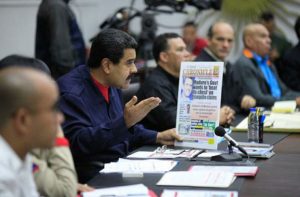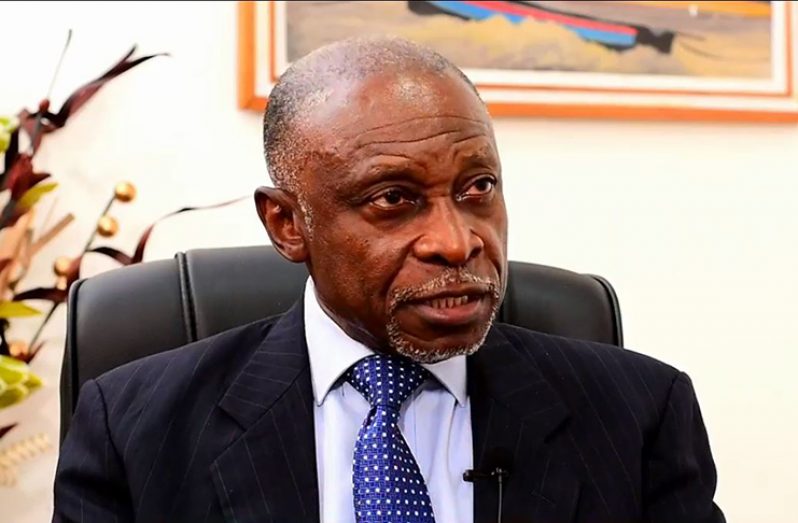– but ExxonMobil has weathered the storm
THERE was nothing typical about Guyana’s situation and the renegotiation of its oil contract when one considers the decades-old threat of Venezuela and its negative influence on business in Guyana’s Exclusive Economic Zones (EEZs).
As a guest on the Guyana Chronicle’s online programme, Vantage Point, Foreign Secretary, Carl Greenidge detailed the numerous threats of Guyana’s Spanish-speaking neighbour and how the country – through its leaders — put earlier developments in Guyana at risk.
A REAL THREAT EXISTS
Though some might want to believe that the threat against Guyana by Venezuela is a mere idea, Greenidge informed the public that the neighbouring country has shown its true colours to the world on numerous occasions and these do not favour the best interest for Guyana.
“The impacts of Venezuela’s claims are not cerebral. It’s not something that just exist in people’s minds or on the part of some wicked political party. We have a situation, since 1962, in which Venezuela has tried to prevent Guyana from utilising the resources that have constituted its boundaries,” he said.
In December 2018, Guyana’s territorial integrity was violated when a Venezuelan Navy corvette – the Karina PC-14 – made a hostile incursion into Guyana’s EEZ.
The incursion took place at approximately 144 kilometres (km) from the boundary which separates Guyana from Venezuela and saw attempts by the Navy corvette to land a helicopter on the unarmed oil survey ship.
In a firm statement, the Ministry of Foreign Affairs rejected Venezuela’s aggression as a violation of the Charter of the United Nations and general international law.
Some years ago, in 2013, a petroleum exploration vessel – RV Teknik Perdana –conducting a survey in the Roraima Block offshore, was intercepted by a Venezuelan Navy frigate and ordered to cease its activities.
Greenidge also noted that Venezuela has also utilised its military to exclude Guyana from its half of the Ankoko Island and have even fired at Guyanese in the Cuyuni River, killing them.

The issue dates back to the Arbitral Award of 1899, and in March 2020, the International Court of Justice (ICJ) will hear arguments on whether it has jurisdiction to adjudicate over the validity of the award even as Venezuela remains uncooperative.
HINDRANCE TO BUSINESS
Though ample time was given for other methods of resolution, Greenidge said that the court must now decide as there is no other peaceful resolution on the horizon based on the actions of the Spanish-speaking neighbour.
He explained: “[It was decided in 2015] that notwithstanding 50-odd years of work on this; 50-odd years of attempting a diplomatic resolution, a last attempt should be made at the diplomatic level and that last attempt failed.”
In the meanwhile, Venezuela’s threat to Guyana is hindering business and development in its maritime zone.
“Venezuela has had the effect of restricting the exploration work being done on our shelf and since that time Exxon and the other operators, Anadarko, have not ventured beyond the line where their vessels were intercepted by the Venezuelans,” the Foreign Secretary pointed out.
“It means that a resource belonging to us, recognized as ours by the world, could not be exploited by Guyana,” he added.
He also informed the public that Venezuela wrote to businesses which were either contemplating or were in the process of investing in Guyana threatening them with military and civil actions.
Giving an example, he stated that in the 1980s, Canadian company, Home Oil, explored the Takatu Basin and found some oil but before it could proceed further the company was taken over by Hiram Walker, a business with interest in a variety of places including in Venezuela.
“For reasons I have yet to understand other than political reasons, the well activity was completely close,” he said.
“It means that what we’ve been able to discover on the shelf today in the petroleum sector could have been discovered in the 1960s if companies were not afraid of working in Guyana’s waters…there’s been an income loss experience by us over these four or five decades,” Greenidge reasoned.
He stated that the issue is “significant” as Guyana has long been recognised as a developing country which ought to have long benefitted from its resources to ensure its citizens and future generations a better life.
“So, it is foolish and I would use as strong a term as that — undiplomatic— to be saying to the public ‘Guyana was okay and therefore whatever was decided in 1999 when Exxon was granted a licence by the PPP Administration, that was wrong’. The circumstances were peculiar and whilst the PPP gave, in the eyes of many, an excessive concession to Exxon, I have no difficulty with it and I have no difficulty not because Exxon pays me or I’m looking after Exxon’s interest, but because that has turned out to be in Guyana’s interest,” the Foreign Secretary explained.
In an independent investigation into the government’s signing of the 2016 Petroleum Agreement with ExxonMobil by UK-based global law firm, Clyde & Co, it was brought to the fore that the signing was influenced, in part, by the government’s intent of maintaining a strategic relationship with ExxonMobil and its partners as the country’s territorial integrity was at threat by Venezuela.
The contract was renegotiated and signed with Esso Exploration and Production Guyana Limited (EEPGL) and its partners, Hess Guyana Exploration Limited (Hess) and China National Offshore Oil Corporation (CNOOC).
EEPGL is a subsidiary of Exxon which is the largest US oil and gas company closely associated with the interests of the US government; Hess is a major US oil and gas company whose interests are likely to be protected by the US government and CNOOC is China’s third-largest state-owned oil company.
The Foreign Secretary said that while persons are entitled to their opinion: “The assumption that any old company has Exxon’s capacity technically or Exxon’s resolve to continue when they are pressured — as they have been by neighbours— is foolish.”
The Clyde & Co report completed on January 30, 2020 concluded that “the 2016 Agreement was negotiated and orderly executed in accordance with the [Petroleum] Act and the Regulations.”
Meanwhile, Greenidge urged Guyanese not to get caught up with the sensationalism in the media by looking at Guyana’s royalty alone but to look at the bigger package.
Apart from 50 per cent profit oil and 2 per cent royalty, the government will also receive withholding taxes. It has already secured US$18M signing bonus, while over 1,900 persons are directly employed in oil and gas sector to date. Additionally, there has been over US$300M in foreign direct investment to date and over 700 service providers.



.jpg)










